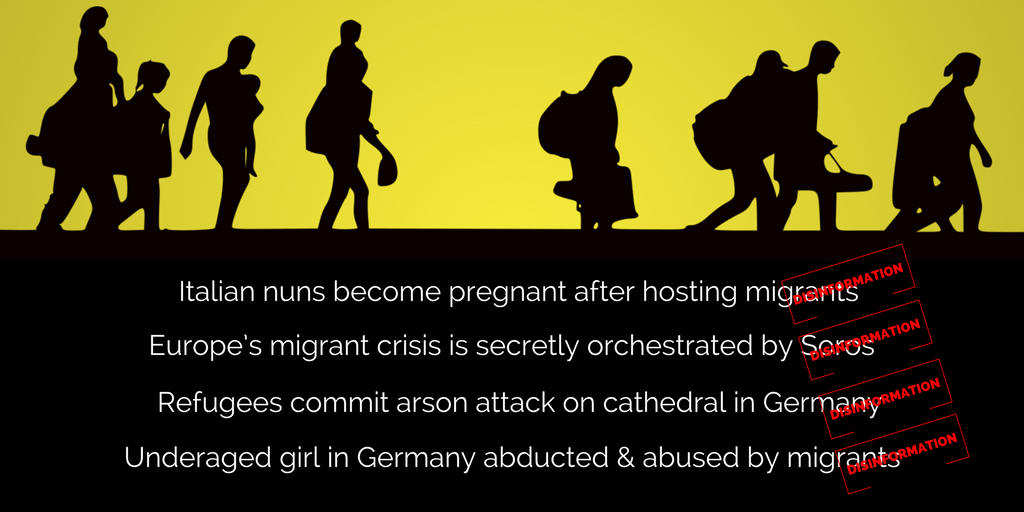Pro-Kremlin outlets share an often-repeated narrative about migrants in the EU Member States. It combines elements of misinformation with a factual background of refugees arriving in Europe in large numbers. The pro-Kremlin narrative focuses on stirring up alarmist sentiments and is supported by a promotion of hate-speech. As a case from Sweden illustrates, the strategic aim is to bring confusion and to stir up controversy in public debates: A Swedish freelance writer, with an established financial dependency on Russian citizens, wrote articles about migration under several aliases. Some of these argued against Sweden receiving more migrants, while others were radically pro-immigration.
What is the pro-Kremlin narrative about migrants? Rather than paraphrasing, we can simply quote a statement made by talk show host Pyotr Tolstoy (who is now Deputy Speaker of the Russian State Duma) on 1 July 2016: “In countries like France and Belgium, [migrants] have been spoiled with welfare benefits, which they receive for not working, they are allowed to receive these welfare benefits for the many wives they can have in accordance with their beliefs,” Tolstoy said, and continued: “This is what has resulted in the bomb explosions in Paris and the explosions in Brussels.” Watch it here (from minute 12:02, in Russian). Tolstoy’s statement introduces the discussion, but provides a distinct framing: European governments are depicted as weak and naïve; migrants are their antagonists, being cynically abusive of the welfare system, and potential terrorists.
A textbook example of how the pro-Kremlin narrative about migrants is promoted is the so-called “Lisa case”, which displayed a well-coordinated disinformation exercise, involving Russian state media, social media, trolls and political leaders. In January 2016, an unfounded rumour about the alleged rape of 13-year old Lisa from a Russian-speaking family in Berlin was spread on social media: The girl claimed she was abducted by migrants, held for many hours and raped by them. The story was picked up by trolls and Kremlin-loyal media and led to thousands of German Russian speakers protesting against the German government. Russia’s Foreign Minister also brought up the unconfirmed allegations at a press conference. For a thorough account of the “Lisa case”, see NATO’s article “The ‘Lisa case’: Germany as a target of Russian disinformation”.
Another case of migration-related disinformation saw pro-Kremlin media actively relay allegations that a large group of refugees committed an arson attack on the Dortmund cathedral in Germany. This story had originally appeared in the American outlet Breitbart. For more examples of pro-Kremlin disinformation targeting Germany, see our recent article.
The Disinformation Review has over the last 18 months reported many other examples of how the pro-Kremlin migrant narrative has been used. Here is a selection:
- In October 2016, disinformation about a migrant allegedly being acquitted of a sexual attack in Austria made it all the way to Russia’s state-controlled TV Pervy Kanal as well as to public comments made by President Putin. What had happened was that the judicial trial had to be repeated and the accused remained in custody awaiting new proceedings.
- A particularly embarrassing moment for Russian state media was when TV host Dmitry Kiselev’s show Vesti Nedeli was caught mistranslating and misrepresenting answers made by French by-passers about migrants, as we described in May last year. The French TV show Le Petit Journal found the original interviewees and they confirmed that Vesti Nedeli had turned around their statements into expressions of xenophobia.
- Pro-Kremlin disinformation about migrants in Europe has its even more bizarre moments, e.g. when the Russian state outlet Sputnik reported in September last year that European citizens allegedly envy migrants for their polygamy
- Sputnik also reported that Europe’s migrant crisis is in fact secretly orchestrated by George Soros.
- The outlet of the Russian Defence Ministry, Zvezda, informed its audience in February that nine nuns in a Milano monastery became pregnant after hosting five migrants (and an orgy with them): Apparently, Zvezda picked up a satirical article published by an Italian outlet that was not to be taken seriously.
One important aspect is that hate speech is far more accepted in pro-Kremlin media and e.g. on Russian state TV. As we have reported, racist, homophobic and anti-Semitic utterances are not only accepted, but promoted by leading Russian TV hosts, for example in their recent campaigning against Emmanuel Macron’s candidacy to be President of France.
All politics is at least to some degree local: Many media, including the Washington Post have pointed out that Russia’s own migration issues have recently surfaced in discussions after the terrorist bomb in the St. Petersburg metro in April. Similarly, when pro-Kremlin media peddle the narrative that Swedish cities have immigrant dominated “no-go zones”, the situation in Russia’s Chechnya calls for comparison – a place which it would be difficult not to identify as a no-go zone for gay men and even journalists.
Read more:
- Deception, Disinformation, and Doubt: Hybrid Warfare in Eastern Ukraine
- Austria: a weak link in Europe or historical ally of Ukraine?
- Putin said plotting a new refugee crisis to influence EU elections
- Putin overplays his hand with Lisa Case in Germany and loses friends in Berlin, Mitrokhin says
- Weakness not strength behind Putin’s new doctrine for broader information war abroad and at home
- Pocket Vocabulary of Kremlin-speak
- “Our Lisa” lied to Lavrov; Lavrov lied to the world
- Russia’s low-tech trolls in high-power western information space
- Russian propaganda exploits German feeling guilt for attacking USSR – Yuriy Durkot
- Propaganda stereotypes paralyze Russia’s potential for change
- The EU will help accommodate migrants from Eastern Ukraine
- Stages of Russian occupation in a nutshell




